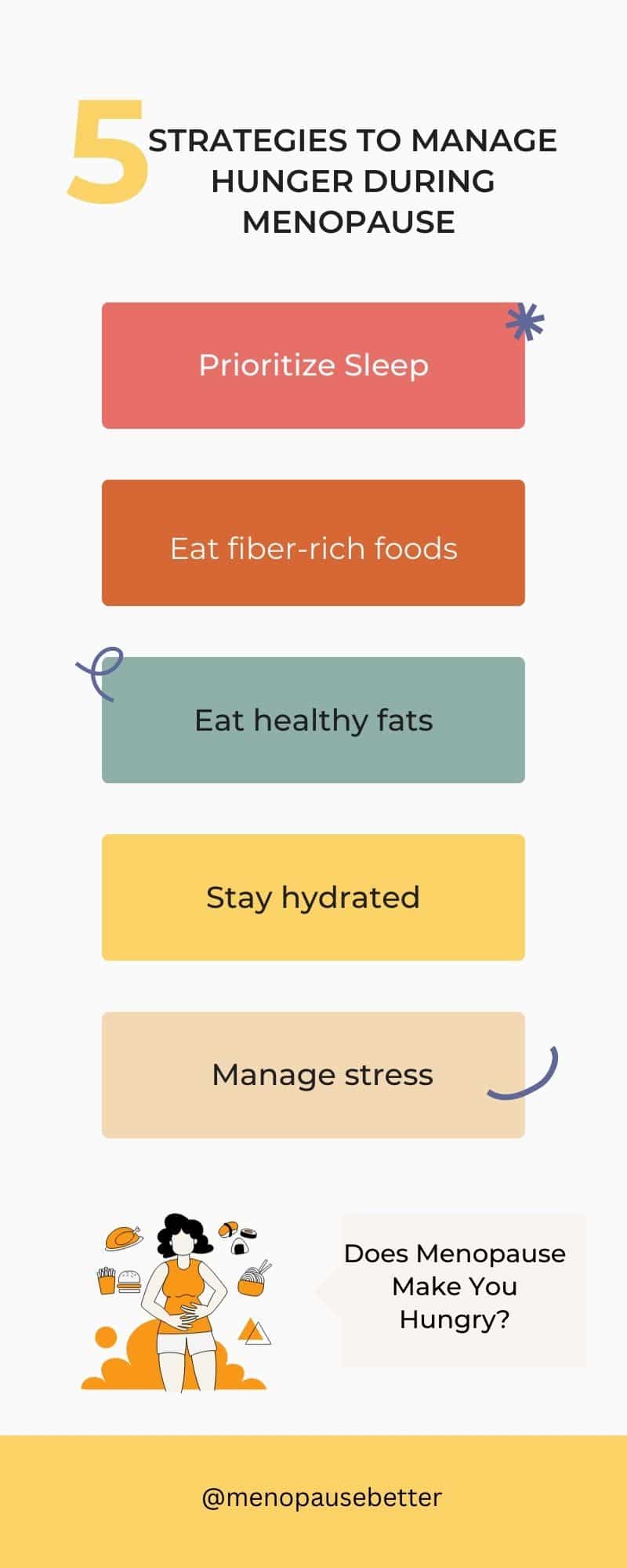Does Menopause Make You Hungry?
During menopause, hormonal changes can affect hormones such as leptin, ghrelin, and insulin, which are responsible for regulating appetite.
Table of Contents
ToggleBut the erratic behavior of estrogen and progesterone can also change cortisol, the stress hormone. Indirectly, this, too, can make you hungry during perimenopause and menopause.
Hormone changes can cause overeating and weight gain, which can make menopause symptoms such as hot flashes and mood changes worse.
However, there are strategies to manage hunger during menopause, so keep on reading.
Hormonal Changes and Hunger
The relationship between estrogen, progesterone, and hunger is complex and multifaceted. Sex hormones help you maintain a healthy weight. They do this by influencing hormones such as leptin, ghrelin and insulin, which are responsible for regulating appetite.

In the transition to menopause, a period called perimenopause, estrogen and progesterone become erratic. Contrary to what many think, it is not a steady decline but rather a rollercoaster that can last months or years.
When these hormones behave in such an unpredictable way, it can disrupt the balance of the hormones leading to increased hunger.
Additionally, estrogen and progesterone affect cortisol, the stress hormone, and chronic stress can increase appetite. High levels of cortisol at the wrong times also make sleep more difficult, which can result in hunger.
So, you can say menopause makes you hungry.
Other Factors Contributing to Hunger During Menopause
Inadequate Sleep
Hormonal changes in menopause can affect sleep in several ways, which in turn can impact hormones related to hunger and appetite.
First, lack of sleep or poor sleep can increase ghrelin levels, the hormone that stimulates appetite. It can also decrease levels of leptin, the hormone that suppresses appetite. When we don’t get enough sleep, we can experience increased hunger. This can cause us to crave high-calorie foods.
Poor sleep affects our mood and energy levels. This can lead to making unhealthy food choices, such as overeating, to gain an energy boost.

Lastly, poor sleep further increases cortisol levels, which can increase stress and lead to stress eating.
Overall, getting adequate sleep is an important component of maintaining a healthy weight and managing hunger.
Stress
Beyond the added stress created by the hormones, there is the stress many women face in their daily lives.
Women in perimenopause and menopause are often the sandwich generation, taking care of both aging parents and their own families. At the same time, many women have demanding jobs that also create stress.
Such stress can lead to further hormone imbalance and poor sleep, both leading to increased hunger levels.
Does Menopause Make You Hungry?
The answer to this question is yes. Perimenomenopause and menopause make you hungry due to changing hormone levels, stress, and lack of sleep.
Strategies to Manage Hunger During Menopause

Prioritize Sleep
The best tool to fight hunger in menopause is to prioritize a good night’s sleep. This can help you regulate your hormones. A good night’s sleep is the key to happiness and a healthy weight.
Eat Enough Protein
Eating enough protein is an important strategy to manage hunger during menopause. Protein helps regulate appetite hormones, keep us feeling full for longer, and reduce cravings for unhealthy snacks or overeating.
Good protein sources include fish, chicken, beef, tofu, legumes, eggs, and dairy products.
Eat Fiber-Rich Foods
Additionally, increasing your intake of fiber-rich foods can also help keep you feeling fuller for longer periods of time.
Foods high in fiber include whole grains, fruits, and vegetables.
Eat Healthy Fats
Healthy fats, such as those found in olive oil, avocados, and nuts, help keep you feeling full and reduce cravings.
Stay Hydrated
Staying hydrated is important for managing hunger. Dehydration can trigger hunger and thirst signals, so drinking water regularly helps you distinguish between the two.
Manage Stress
Managing stress levels is important for regulating hormones and appetite. Try relaxation techniques like meditation, yoga, or deep breathing to lower cortisol levels and reduce stress eating.
The Bottom Line
The bottom line is that menopause can make you feel hungrier due to the changing hormone levels, stress, and lack of sleep.
Managing hunger during menopause requires several steps:
- Prioritize adequate sleep
- Ensure you eat enough protein
- Include more fiber-rich foods in your diet
- Add healthy fats to your meals
- Stay hydrated
- Manage stress levels
You got this!!

Dr. Su-Nui Escobar, a Registered Dietitian/Nutritionist in Miami, FL, is dedicated to empowering women in perimenopause and menopause to live healthier, more satisfying lives.
With a doctorate in clinical nutrition from the University of North Florida, she has expertise in menopause and weight loss, including the unique challenges faced by those on weight loss medications.
Su-Nui’s passion for her field is evident in her previous role as the Academy of Nutrition and Dietetics spokesperson.


